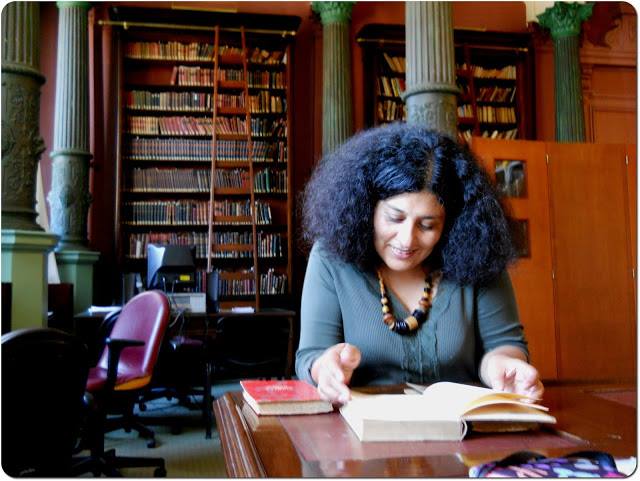THE CENTURY PALM
I sprint down the narrow alleyway, arms pumping and feet flying. Boots pound the broken pavement behind me—blap, blap, blap. Babylon is hot on my tail. “Stop or we’ll shoot!” the cops holler like a line straight out of a movie.
I pick up my pace. The pockets of my cargo jeans are stuffed with wads of lightweight cash instead of the bulky mangoes I pilfered in my youth, so I might have a chance. Yeah, man. If I can pull this off, everything is bound to improve. I can settle my debts, pay Ma’s doctor bills, liberate my sister from the gangsta who’s holding her captive, and maybe even wrangle a set of wheels. But first I have to ditch the law.
I race past closed shops and rundown shanties. A borrowed ski mask scratches at my eyes. Broken glass crunches underfoot, and ghetto dust that smells like stale pee fills my nose. A familiar voice rings in my ears when I swing around a tight corner. ‘Where you think you going, Lucien?’
Granny?
I lose concentration and step down on a nail sticking out from a rotten board. Blood gushes from the sole of my sneaker. I stagger into a dimly-lit doorway and try to pry the wood loose. It comes off in my hand, but the nail stays put. I stare at the pool collecting under my foot, and I start to feel giddy. But I can’t rest here for long.
The sound of angry voices launches me back onto the road. I tear off the sweat-soaked mask and see a telltale trail of red soaking into the dust. I limp toward the gate to the abandoned botanic gardens. For a moment I think to surrender. But the barrier that separates the innocence of my childhood from the chaos of this messed up modern world is right in front of me now. Breathless, scared shitless, I lunge toward the gate like a wild animal trying to escape its cage. Gunshots explode all around me. Sparks ricochet off of the chain link like fireworks. I vault up and over. My bulging pocket catches on a piece of stray wire on the way down. The bundle of money spills out while I struggle to get free. Fuck! I leave my pants hanging like forgotten laundry and hop across the lawn in my boxers. But the police have circled around and are waiting at the other end, so I pull up short.
Lights flash and harsh words blare from bullhorns. I crouch down in the weeds under one of the few remaining trees in the place. Panting, I lean back against the trunk and gaze up through the huge umbrella-like foliage trying to come up with a plan. That’s when it dawns on me: I’m sheltering under the Century palm. According to family lore, it’s the same tree that my great-great-grandfather brought with him from England as a seedling and planted in our botanic gardens. Granny Lucy, who was my mentor and my round-a-bout namesake, used to bring me here during school holidays and tell me stories about days gone by. But now’s not the time to linger on memory lane. Things are extra crucial. I squeeze my eyes shut and hold my breath while seeds the size of ping pong balls rain down on my head. I don’t exhale until the cops pass me straight and head for the massive stand of bamboo where lovers meet and criminals lurk.
I’m thinking to make a break for it when I hear Granny’s voice again. ‘Can you believe it, Lucien? It’s been exactly one hundred years.’
The present moment slips away, and my mind rewinds to a simpler, happier time.
*
“Lucien, this tree is one of the most amazing plants in nature,” Granny Lucy used to say when we picnicked under the Century palm. “That’s why my grandfather, Sir Henry, brought a seedling along on the boat when he was appointed chief horticulturalist on this island. Near the end of its life, it sends up a flag pole from the center of its crown that turns into a Christmas tree when it blooms.”
I was just a little kid. “No way!” I giggled. “With baubles and lights and all?”
“Would I lie to you, boy?” She smiled and gave me a hug. “But it spends so much energy sending up that big shoot—making all those flowers and setting all that fruit—that it forgets about taking care of number one. Eight months later, it withers and dies.”
I didn’t like to hear about death since my father, Archie, had been killed in a car crash, but Granny Lucy continued talking as if dying was the natural thing to do. “Of course, I’ll never live to see it. It only happens once in a hundred years. That’s why it’s called the Century palm.”
“We’ll see it together, Gran,” I said hopefully.
“No, Lucien. By that time I’ll be gone. But if you keep your eyes open, you’re sure to witness it for yourself.”
Things were different after Granny passed on. My life wasn’t fun like before. I begged Ma to take me to visit the Century palm, but she never did. Then the weather on the island began to change. It was broiling hot and hardly ever rained. Rivers dried up, and water, which had always been so plentiful, had to be rationed. People used buckets and old metal drums to collect dew off their roofs, but there was barely enough water to keep mosquito larva afloat. After the island’s crops failed, folks weren’t much interested in anything beyond day-to-day survival. Horticulture was considered a lost art, and Sir Henry’s prized botanic gardens were permanently closed.
When Ma got sick with a viral fever, she lost her job. Things were tight at home, so I joined a teenage gang to free myself up. Granny would be vexed to know that smoking weed and jamming rude music with my partners was suddenly more interesting than family life. But as far as I could reckon, there was only one way to get the cash I needed for Ma’s medicine and to score the drugs I was hooked on. I started out stealing from friends and neighbors, and then I moved up to robbing gas stations, small businesses, and finally ATMs. I’d been running from a cash machine tonight, but I shoulda known that on a small island like this there’s really no place to hide.
*
So here I sit under the same tree where Granny used to bring me when I was small—caught like a rat in a trap, stuck like a fly on a strip of sticky yellow paper. I go to reach into my pants pocket for something to ease my mind, and I’m surprised to find I’m not wearing any—pants, that is. I left them attached to the gate.
Something in the air shifts, like a bell being struck in the distance. The wind moans, and the dead leaves of the Century palm rattle against its trunk like shak-shaks in an old-fashioned jing ping band. Shak, shaka-shaka, shak. Time stands still for a moment and then fast-forwards. When I look up, I see a translucent sprout that looks like a fountain shooting from the palm’s crown just like Granny told me it would. It’s covered with thousands of white blossoms that shine like magic against the dark sky. Ghostly shapes that are either bats or jumbies slam into the ripe fruit. The moon passes through all of its phases eight separate times. I feel the ground shake. Then a long drawn-out cracking sound echoes through the abandoned gardens. Right on schedule, the Century palm collapses. It flattens everything in its path including me, worthless, thiefing Lucien.
I expect to get some sympathy from Granny Lucy, but she seems amused instead. ‘Eh, eh. Took you by surprise, not true? Don’t worry, Lucien. You’re too young to die.’
As usual, Granny’s right. I might be knocked out on the lawn, but I’m still breathing. Maybe there’s still hope for a rude boy like me. Maybe it’s not too late to change.
*
Granny and I used to play a numbers game. To be born, she said, everyone had to have had two parents, four grandparents, eight great-grandparents, sixteen great-great-grandparents, and so on. Granny Lucy, her grandfather Sir Henry and his wife, Priscilla; their daughter Jasmine and her husband, Geoffrey; and my father, Archie, were all milling around in my head. I hoped they might have some positive advice to offer me, but most of the talk was negative. As far as I can remember, the conversation went something like this . . .
“Lucien. I’m really disappointed in you,” Sir Henry said, shaking his finger. “I thought a chap with your breeding would have had better sense than to get yourself into this kind of mess.”
I swallowed hard. “Believe me, sir; I didn’t plan it this way. Why’d you plant that big ole stupid tree in the first place if you knew it was going to self-destruct?”
Henry frowned and straightened his vest. “The Century palm is not on trial here, you are! But for your information, Lucien, I planted the tree because I was brought up to believe it was important to leave something meaningful behind for future generations. That’s why I married Priscilla. She was a respectable woman who I expected would raise up proper, God-fearing children.”
I cut my eyes at Priscilla. She looked kinda fuzzy. “Are you okay?” I asked.
“Lord help us to rise above our suffering,” she mumbled.
“Speak up!” Henry boomed. “How many times have I told you to enunciate clearly?”
She didn’t answer, only shrank further into her shell.
Sir Henry turned his attention back to me. “As I was saying, I planted the Century palm as a legacy. What, I wonder, will be your contribution?”
I shrugged. I had to admit I’d never given it much thought. “Maybe I’ll have some cute little kids someday,” I said.
“To what avail? So you can teach them how to thief like you do? In your case, genetics must have gone astray.”
His daughter Jasmine interrupted. She died the year I was born, but I knew her from a picture Granny Lucy showed me when I was small. “Why are you always so judgmental, Papa?” she asked.
“Because I’ve been knighted!” Henry shouted.
But Jasmine didn’t back down like her mother. “Well, things are a lot different nowadays. I hope you haven’t forgotten how hard Geoff and I campaigned for social reform in the Caribbean so people could have choices about how they lived their lives.”
Sir Henry peered over the top of his wire-rimmed glasses and glared at her. “You always were a rabble-rouser, working on that radical newsletter and delivering it to foolish women like yourself by bicycle. And when you married that colored man, a Catholic nonetheless, things went from bad to worse.”
I knew that Henry was a devout Christian with very strict beliefs, but the fact that he was prejudiced, intolerant of women, black folks, and Catholics was news to me.
“I loved Geoff,” Jasmine said. “Together, we fought for equal rights and justice.”
Geoffrey, a handsome devil, smiled. “And I loved Jazzy, too.”
“Ha!” Henry ranted. “You left her alone with those horrible half-breed children in order to pursue your own trumped-up political career! And when they finally threw you out of parliament, my daughter welcomed you home with open arms. Had you no pride, man?”
Hmm. Interesting. According to Granny, Geoffrey had been a good father, and Jasmine was a shining example of maternal love.
“Get a grip, Grandpa,” Lucy said. “This is about Lucien, not some grudge you have against my daddy.”
But rather than being insulted, Geoffrey seemed delighted. He winked at Henry and swatted Jasmine’s backside. “Let’s go, sweetheart,” he said.
Henry, fuming, followed them out just as my father, Archie, butted in. “Luce? Aha! There you are. I’ve been looking for you.”
I wondered when he was going to show up. Don’t get me wrong. I liked Archie. He was generous and funny when he was sober. But when he was drunk, it was a whole other story.
Granny prickled even more. “Who invited you?”
Come to think of it, Sir Henry wasn’t the only one in the family who was prejudiced. She never could abide the fact that Archie, a pureblooded Kalinago Indian, stole my mother away to live on the reservation and then disrespected her. As far as she was concerned, Ma had wasted her energy trying to turn the savage into a decent man.
Accustomed to Gran’s hostility, my father carried on as usual. “I thought this was supposed to be a party,” he said, making me wonder if they had cask rum here in La-La Land. “By the way, son, how’s your mother? How’s Rosie?”
“Ma’s been sick for some time.”
At the mention of my mother’s illness, Granny really went off. “That’s why Lucien took to stealing,” she said. “If you hadn’t been such a vagabond, there might have been something left over for Rose and the children when you died.”
It was past time for this conversation to get real. “Actually, helping Ma wasn’t the only reason for my thiefing. I was greedy and hooked on drugs,” I said.
My father didn’t seem to hear me. He was already on the move, probably headed to the next rum shop. But by the way he looked at me before he faded into the background, I could tell he was disappointed.
“Wait!” I pleaded. “I can change! I’ll make you proud someday!” But Archie just kept on walking.
I turned to face Granny, who seemed to be the only one willing to listen. “Gran, I’m sorry I let you down. I love you, and I never meant to cause you any pain. I promise I’ll try to do better from now on.”
She squeezed my hand. Granny liked to talk tough, but she was like a hard nut with a soft, sweet center when it came to dealing with me. “Apology accepted, Lucien. Everyone deserves a second chance. Let’s just hope you’re smart enough to take advantage of it. Now snap out of it, boy!”
*
I wake up in a clean but unfamiliar bed as if Granny had waved a magic wand. My girlfriend Patsy is bent over me with a worried look on her face. “Boy, Lucien. That was some fever you had going on. We thought we were gonna lose you for a time.”
“Fever? What fever? Where am I?”
“You’re in the hospital. The doctors said you might have got tetanus in your foot. They gave you a series of injections. Whatever it was, it caused you to hallucinate bad, man.”
“What did I say?”
“You kept on raving about losing your pants.”
When I check under the sheets, I see that my foot’s bandaged, and I’m wearing the same boxer shorts as in the gardens. “Patsy, do you have any idea what happened to my jeans?”
“You were wearing those same boxers when you were admitted.”
“And what about the money?”
“What money?”
I decide it’s best to change the subject. “Never mind. How’s Ma?”
“Your mom’s doing better,” Patsy says. “She’s been to visit you every day.”
“How long have I been in here?”
“Over a week. But the doctors said as soon as the fever broke, you could go home. So many people are ill with the mosquito borne virus; I guess they need the bed.”
“Home to where?”
“Don’t you remember? We rented a house right before you got sick. It needs a lot of work—a couple of gallons of bleach to get rid of the smell and a new coat of paint—but the place is ours for the time.”
“Actually, I don’t remember much from before. How’re we gonna pay for it?”
“I got a job!”
“Doing what?”
“When the nurses saw what good care I took of you, they recommended me as an aide. I start next week.”
I can’t get over my luck. Somehow I’ve escaped from the cops, Ma is better, and I have a nice girl with a job plus a place to go home to. But then I remember the money. “Yeah, but what am I supposed to do to earn bread?”
Patsy has me sitting up in a wheelchair and is buttoning my shirt. “Don’t worry, baby, something will turn up.” She gives me a hug and a long, sweet kiss. “For now we just have to concentrate on getting you well.”
I grin. “I’m feeling better already.”
The bus ride through the ghetto to our shack is depressing. Peeling paint, derelict galvanized, and the smell of garbage are chronic. Partners dealing drugs and ladies of the night selling their bodies in broad daylight are draped on every corner. Old friends call out to me as we pass, but I turn my head and hold onto my girlfriend’s hand like a drowning man holds onto a life ring. A wave of déjà vu ripples through my gut when the bus turns into the alley that dead-ends at the botanic gardens.
Wait a minute. Was the scene with the cops chasing me real, or was it a hallucination caused by the fever? What about my bandaged foot and missing pants, not to mention the collapse of the Century palm and the time I spent in La-La Land with Granny Lucy and my troublesome ancestors?
I’m still wondering when I hobble inside the ramshackle house.
“Make yourself at home,” Patsy says. “I’ll warm up the food.”
I’m surprised to find a plastic leather recliner parked in front of a brand new TV set in the living room. I peep into the bedroom. “How’d you get the money for all this?”
“I took credit at Blings,” Patsy calls from the kitchen. “Once I start work, we can get a mirror and dresser to match the bed.”
I sigh and pick up her cell phone. I guess I left mine in my pants, wherever they are. I dial Ma. She sounds okay at first, but when I start to tell her about my run in with Granny and Archie, she doesn’t believe me.
“But it was so real. Archie even asked about you.” She sucks her teeth and cuts the call short.
While we eat, I quiz Patsy to see if she knows anything about a robbery that happened about a week ago. She thinks I’m talking about the news report that’s blaring from the TV. “Which robbery? There’s dozens of them every day.”
It’s time to come clean. “I might have robbed an ATM,” I whisper. “I kind of remember the Babylon chasing me. I stepped on a nail, lost my jeans with the stolen money in the pockets, and then the Century palm collapsed on top of me.”
“What collapsed?”
“The Century palm. The tree Sir Henry brought with him from England as a seedling.”
“Who’s Sir Henry?”
“Granny Lucy’s grandfather.”
“Granny Lucy?”
I realize I’ve never bothered to discuss my family history with Patsy. “Granny Lucy was the most important person in my life, besides Ma, and now you, of course.”
“You keep talking about money,” she says. “What money?”
“I guess that part might be wishful thinking.”
Patsy smiles and shows her dimples. “Lucien, you’re crazy, but I love you anyway.”
“I love you, too, baby.”
*
Time passes. Patsy starts work, but I’m still too shell shocked to function. I can’t get the “incident” out of my mind. Friends call offering drugs, but I’m determined to stay clean. I need to look for a job, but I’m afraid to show my face on the block. So I stay inside the house brooding with the curtains drawn. Then one especially boring afternoon, I get up and wander outside. The yard looks like nobody cares. There are no trees or shrubs, not even a flower plant in an old paint tin to liven up the porch steps. I feel useless and ashamed. Why haven’t I bothered to try to fix the place up? I look longingly down the road toward the botanic gardens, the oasis that was special to me as a child. The gate is off its hinges, so it would be easy enough to squeeze through.
A mangy dog whines and beats its tail in the dirt as I wriggle inside. The place is like a desert now. There’s no trace of the Century palm or any other greenery, only a kind of corral made from branches of dead bamboo off in a corner. For some reason I start to cry. I guess it’s because everything that connected me to the past has disappeared, the present moment sucks, and I have no clue about the future. Tears are running down my cheeks when a voice—definitely not Granny’s—startles me.
“Lucien?” An old white man wearing a pith helmet with a ratty ole feather stuck in the hatband taps me on the shoulder.
I jump back. “Who are you, and how you know my name?”
He sets down his wheelbarrow and wipes his brow. “I used to work here. Your Granny Lucy and I are related.”
“Related how?”
“By blood. I’m Henry.”
I study him. “Sir Henry?”
“You can drop the Sir, Lucien. I’ve come to realize that all that pomp and ceremony was ridiculous in the long view. Colonial times are gone, thank goodness. Everybody gets to be themselves now.”
“Okay. If you say so. What’s in the barrow?”
“Seedlings and whatnot.”
“What kind of seedlings?”
“Century palms. The ground was littered with seeds where the old tree used to be. I set up a nursery over there under the cover of the bamboo. Come on. I’ll show you.”
I follow him and his squeaking wheelbarrow across the parched lawn. He pushes back the circle of dead branches to reveal a patch of tilled ground. “Let’s plant the palms here,” he says. “If we water them regularly and give them some fertilizer, one or two might survive.”
“You want me to help you?”
“Everybody needs a little help.”
I’m surprised at Henry’s humility. I guess I’m not the only one in my family trying to change. Truth be told, I’m glad to have something constructive to do. Maybe caretaking runs in our genes after all.
“No problem, Henry. But maybe we should start with something that matures quicker. A Century palm takes a hundred years to flower, you know.”
“Of course I know. I’m just glad you were lucky enough to see it for yourself. But why not give your progeny the same opportunity?”
I’m unsure about the meaning of the word progeny, so I start to dig a hole. “You’re right,” I say eventually. “It would be good to leave something positive behind for posterity—that is, if I ever have any children.”
“Don’t worry. You will,” Henry says.
He seems so certain about my future that I believe him. We work side by side for a time before I get up the nerve to ask, “By the way, do you know anything about a robbery around here a while back?”
Henry grins mischievously. Then he gets up off his knees and walks to the barrow. With great flair, he pulls out my cargo jeans, the ski mask, and a blood-stained board like he’s some sorta magician. “Looking for these, boy?”
I try to snatch the evidence away, but he’s too quick.
“I was planning to burn these rags and bury the ashes in the same bed where we plant the seedlings. What do you think, Lucien?”
I nod. “Sounds like a plan, Henry.”
I’m so relieved I don’t even bother to ask what happened to the money.

Kristine Simelda was born in the US and has been a citizen of the Eastern Caribbean island of Dominica for the past twenty-five years. She is the author of three novels, a novella, two novels and a collection of short stories for young adults, as well as numerous works of published short fiction. Her debut novel, A Face in the River, was launched in 2015 by her imprint River Ridge Press Dominica and followed by the sequel, River of Fire in 2016. Nobody Owns the Rainbow is her latest work of Caribbean fiction. All are available from www.amazon.com in paperback and e-book as well as selected bookstores. Kristine currently lives on the edge of the rainforest where she writes, farms, and feeds large dogs. Her website is www.kristinesimelda.com.

 BACK TO ISSUE
BACK TO ISSUE







